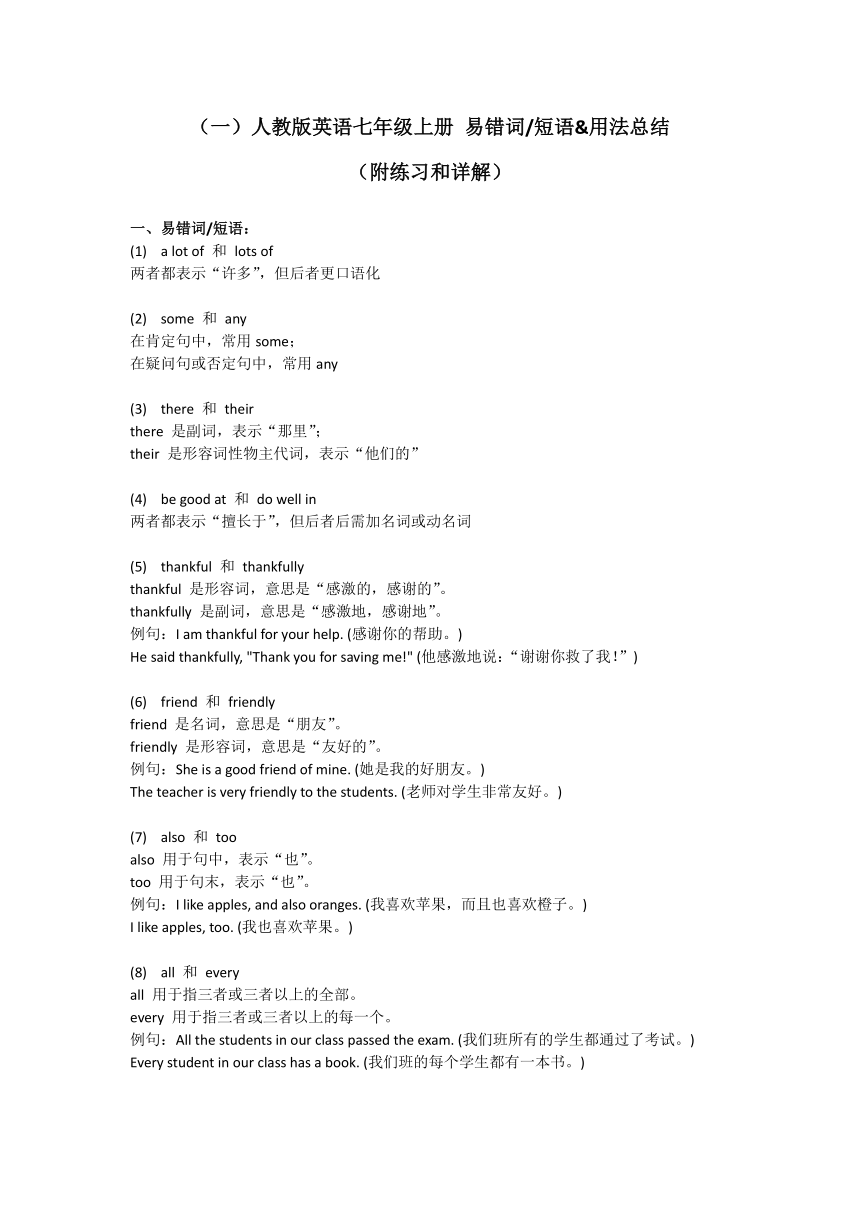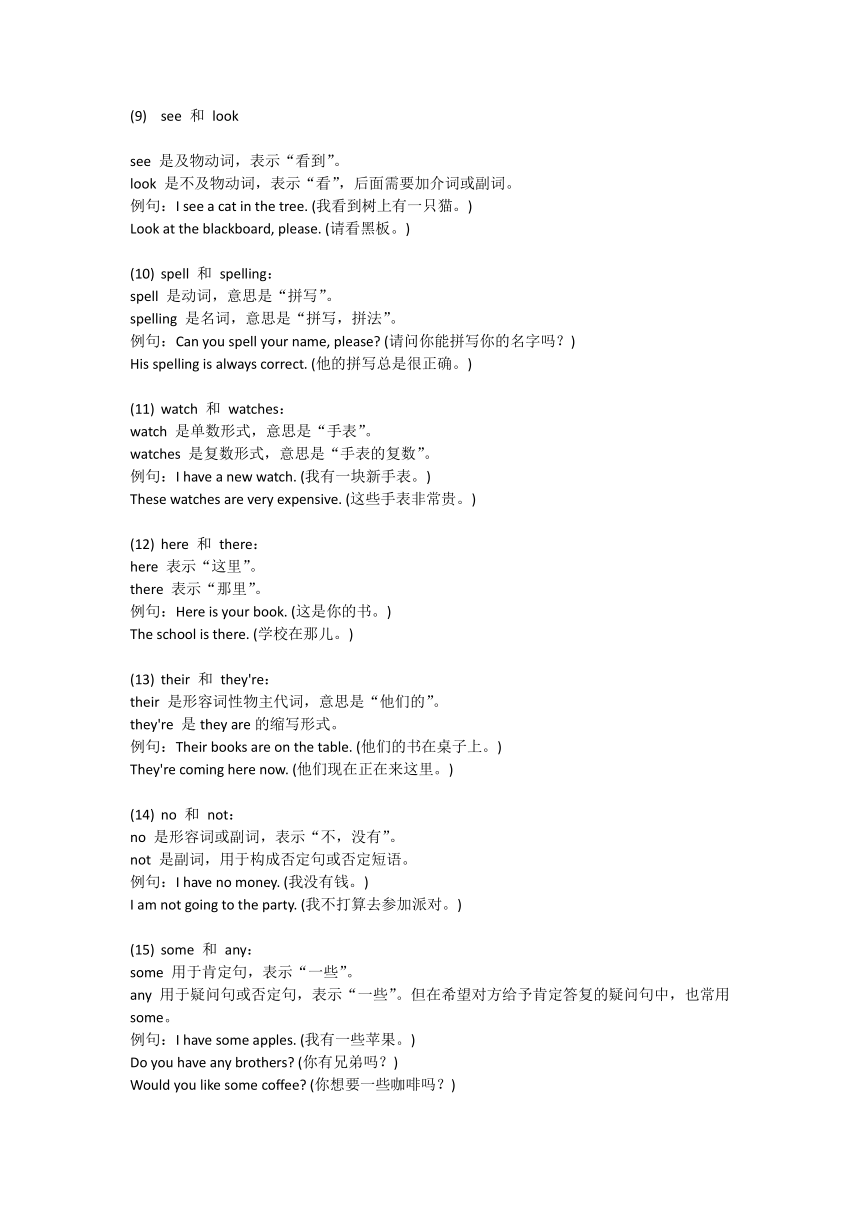人教版七年级英语上册 易错词短语&用法总结(含答案)
文档属性
| 名称 | 人教版七年级英语上册 易错词短语&用法总结(含答案) |  | |
| 格式 | docx | ||
| 文件大小 | 17.7KB | ||
| 资源类型 | 教案 | ||
| 版本资源 | 人教新目标(Go for it)版 | ||
| 科目 | 英语 | ||
| 更新时间 | 2024-02-25 11:06:50 | ||
图片预览


文档简介
(一)人教版英语七年级上册 易错词/短语&用法总结
(附练习和详解)
一、易错词/短语:
a lot of 和 lots of
两者都表示“许多”,但后者更口语化
some 和 any
在肯定句中,常用some;
在疑问句或否定句中,常用any
there 和 their
there 是副词,表示“那里”;
their 是形容词性物主代词,表示“他们的”
be good at 和 do well in
两者都表示“擅长于”,但后者后需加名词或动名词
thankful 和 thankfully
thankful 是形容词,意思是“感激的,感谢的”。
thankfully 是副词,意思是“感激地,感谢地”。
例句:I am thankful for your help. (感谢你的帮助。)
He said thankfully, "Thank you for saving me!" (他感激地说:“谢谢你救了我!”)
friend 和 friendly
friend 是名词,意思是“朋友”。
friendly 是形容词,意思是“友好的”。
例句:She is a good friend of mine. (她是我的好朋友。)
The teacher is very friendly to the students. (老师对学生非常友好。)
also 和 too
also 用于句中,表示“也”。
too 用于句末,表示“也”。
例句:I like apples, and also oranges. (我喜欢苹果,而且也喜欢橙子。)
I like apples, too. (我也喜欢苹果。)
all 和 every
all 用于指三者或三者以上的全部。
every 用于指三者或三者以上的每一个。
例句:All the students in our class passed the exam. (我们班所有的学生都通过了考试。)
Every student in our class has a book. (我们班的每个学生都有一本书。)
see 和 look
see 是及物动词,表示“看到”。
look 是不及物动词,表示“看”,后面需要加介词或副词。
例句:I see a cat in the tree. (我看到树上有一只猫。)
Look at the blackboard, please. (请看黑板。)
spell 和 spelling:
spell 是动词,意思是“拼写”。
spelling 是名词,意思是“拼写,拼法”。
例句:Can you spell your name, please (请问你能拼写你的名字吗?)
His spelling is always correct. (他的拼写总是很正确。)
watch 和 watches:
watch 是单数形式,意思是“手表”。
watches 是复数形式,意思是“手表的复数”。
例句:I have a new watch. (我有一块新手表。)
These watches are very expensive. (这些手表非常贵。)
here 和 there:
here 表示“这里”。
there 表示“那里”。
例句:Here is your book. (这是你的书。)
The school is there. (学校在那儿。)
their 和 they're:
their 是形容词性物主代词,意思是“他们的”。
they're 是they are的缩写形式。
例句:Their books are on the table. (他们的书在桌子上。)
They're coming here now. (他们现在正在来这里。)
no 和 not:
no 是形容词或副词,表示“不,没有”。
not 是副词,用于构成否定句或否定短语。
例句:I have no money. (我没有钱。)
I am not going to the party. (我不打算去参加派对。)
some 和 any:
some 用于肯定句,表示“一些”。
any 用于疑问句或否定句,表示“一些”。但在希望对方给予肯定答复的疑问句中,也常用some。
例句:I have some apples. (我有一些苹果。)
Do you have any brothers (你有兄弟吗?)
Would you like some coffee (你想要一些咖啡吗?)
too 和 also:
too 用于句末,表示“也”。
also 用于句中,通常位于be动词、助动词或情态动词之后,行为动词之前。
例句:I like apples, and I like oranges too. (我喜欢苹果,而且我也喜欢橙子。)
She also has a cat. (她也有一只猫。)
it's 和 its:
it's 是it is的缩写形式。
its 是形容词性物主代词,表示“它的”。
例句:It's a nice day. (今天是个好天气。)
Its tail is long. (它的尾巴很长。)
because 和 so:
because 表示原因,引导原因状语从句。
so 表示结果,引导结果状语从句。
例句:I stayed at home because it was raining. (因为下雨,我待在家里。)
It was raining, so I stayed at home. (下雨了,所以我待在家里。)
二、区分易错词的单项选择
I have _______ apples. (A. lot of, B. a lot, C. a lot of)
答案:C (正确的短语是“a lot of”)
_______ you have any brothers (A. Do, B. Are, C. Is)
答案:A (疑问句中使用助动词do)
He can _______ the guitar very well. (A. play, B. plays, C. playing)
答案:A (can后接动词原形)
_______ books are on the desk. (A. Their, B. There, C. They)
答案:B (描述位置用副词there)
She _______ English very well. (A. is good for, B. is good at, C. does well)
答案:B (be good at后接名词或动名词)
I have nothing _______ to say.
A. else B. other C. elsewhere D. another
答案:A(else修饰不定代词nothing,表示“其他的”)
三、区分易错词的完形填空
Passage One
I have a busy day every day. I get up at 6:30 a.m. and then I have __1___ breakfast. After breakfast, I go to school. I have four classes in the morning and two in the afternoon. I like __2__ very much because I think it's interesting. My favorite subject is English. I can __3___ it very well. My teacher often praises (表扬) me for my good work.
At 4:30 p.m., I go home. I often play sports with my friends for an hour. It's good for my _4__. After that, I start to do my homework. I usually finish my homework at 7:00 p.m. Then I have dinner with my family. After dinner, I sometimes watch TV _5__ an hour. My favorite TV show is the news. I think it's very _6__ for me to know what's happening in the world.
At about 9:00 p.m., I go to bed. I am tired but I am happy because I have a __7__ day.
A. a lot B. a lot of C. lots of
A. math B. music C. science
A. play B. plays C. play the
A. health B. healthy C. healthy
A. for B. in C. on
A. important B. interesting C. difficult
A. boring B. busy C. wonderful
答案:
B (have a lot of = have lots of,表示“有很多”)
B (根据后文“because I think it's interesting”可知是音乐)
A (can后接动词原形,且play后接乐器需加定冠词the)
A (对我的“健康”有好处)
A (for表示时间的持续)
A (知道世界发生了什么对我来说“很重要”)
B (根据前文描述,这一天很忙,所以是一个“忙碌的”一天)
Passage Two
One day, a little girl went to the park with her mother. She saw a lot of beautiful flowers there. She wanted to pick one of them, but her mother __1__ her not to do that. The mother said, "Flowers in the park are for everyone to enjoy, not just for you. If you pick one, it will ___2__ the beauty of the park." The girl understood and said, "Okay, Mom. I will _3___ your advice and not pick any flowers." After that, she ___4__ the park and saw some birds singing in the trees. She enjoyed the __5_ there and learned a valuable lesson about respecting public property.
A. advised B. told C. said D. asked
A. destroy B. protect C. show D. create
A. follow B. give C. forget D. refuse
A. left B. entered C. passed D. walked
A. else B. other C. another D. everything
答案:
A根据上下文,母亲建议女儿不要摘花,所以选A。
A 摘花会破坏公园的美,所以选A,表示“破坏”。
A 女儿表示会听从母亲的建议,所以选A,表示“跟随”。
4. B 根据后文描述,女儿进入公园看到了鸟儿,所以选B,表示“进入”。
5. D女儿享受了那里的一切,所以选D,表示“所有事物”。
(附练习和详解)
一、易错词/短语:
a lot of 和 lots of
两者都表示“许多”,但后者更口语化
some 和 any
在肯定句中,常用some;
在疑问句或否定句中,常用any
there 和 their
there 是副词,表示“那里”;
their 是形容词性物主代词,表示“他们的”
be good at 和 do well in
两者都表示“擅长于”,但后者后需加名词或动名词
thankful 和 thankfully
thankful 是形容词,意思是“感激的,感谢的”。
thankfully 是副词,意思是“感激地,感谢地”。
例句:I am thankful for your help. (感谢你的帮助。)
He said thankfully, "Thank you for saving me!" (他感激地说:“谢谢你救了我!”)
friend 和 friendly
friend 是名词,意思是“朋友”。
friendly 是形容词,意思是“友好的”。
例句:She is a good friend of mine. (她是我的好朋友。)
The teacher is very friendly to the students. (老师对学生非常友好。)
also 和 too
also 用于句中,表示“也”。
too 用于句末,表示“也”。
例句:I like apples, and also oranges. (我喜欢苹果,而且也喜欢橙子。)
I like apples, too. (我也喜欢苹果。)
all 和 every
all 用于指三者或三者以上的全部。
every 用于指三者或三者以上的每一个。
例句:All the students in our class passed the exam. (我们班所有的学生都通过了考试。)
Every student in our class has a book. (我们班的每个学生都有一本书。)
see 和 look
see 是及物动词,表示“看到”。
look 是不及物动词,表示“看”,后面需要加介词或副词。
例句:I see a cat in the tree. (我看到树上有一只猫。)
Look at the blackboard, please. (请看黑板。)
spell 和 spelling:
spell 是动词,意思是“拼写”。
spelling 是名词,意思是“拼写,拼法”。
例句:Can you spell your name, please (请问你能拼写你的名字吗?)
His spelling is always correct. (他的拼写总是很正确。)
watch 和 watches:
watch 是单数形式,意思是“手表”。
watches 是复数形式,意思是“手表的复数”。
例句:I have a new watch. (我有一块新手表。)
These watches are very expensive. (这些手表非常贵。)
here 和 there:
here 表示“这里”。
there 表示“那里”。
例句:Here is your book. (这是你的书。)
The school is there. (学校在那儿。)
their 和 they're:
their 是形容词性物主代词,意思是“他们的”。
they're 是they are的缩写形式。
例句:Their books are on the table. (他们的书在桌子上。)
They're coming here now. (他们现在正在来这里。)
no 和 not:
no 是形容词或副词,表示“不,没有”。
not 是副词,用于构成否定句或否定短语。
例句:I have no money. (我没有钱。)
I am not going to the party. (我不打算去参加派对。)
some 和 any:
some 用于肯定句,表示“一些”。
any 用于疑问句或否定句,表示“一些”。但在希望对方给予肯定答复的疑问句中,也常用some。
例句:I have some apples. (我有一些苹果。)
Do you have any brothers (你有兄弟吗?)
Would you like some coffee (你想要一些咖啡吗?)
too 和 also:
too 用于句末,表示“也”。
also 用于句中,通常位于be动词、助动词或情态动词之后,行为动词之前。
例句:I like apples, and I like oranges too. (我喜欢苹果,而且我也喜欢橙子。)
She also has a cat. (她也有一只猫。)
it's 和 its:
it's 是it is的缩写形式。
its 是形容词性物主代词,表示“它的”。
例句:It's a nice day. (今天是个好天气。)
Its tail is long. (它的尾巴很长。)
because 和 so:
because 表示原因,引导原因状语从句。
so 表示结果,引导结果状语从句。
例句:I stayed at home because it was raining. (因为下雨,我待在家里。)
It was raining, so I stayed at home. (下雨了,所以我待在家里。)
二、区分易错词的单项选择
I have _______ apples. (A. lot of, B. a lot, C. a lot of)
答案:C (正确的短语是“a lot of”)
_______ you have any brothers (A. Do, B. Are, C. Is)
答案:A (疑问句中使用助动词do)
He can _______ the guitar very well. (A. play, B. plays, C. playing)
答案:A (can后接动词原形)
_______ books are on the desk. (A. Their, B. There, C. They)
答案:B (描述位置用副词there)
She _______ English very well. (A. is good for, B. is good at, C. does well)
答案:B (be good at后接名词或动名词)
I have nothing _______ to say.
A. else B. other C. elsewhere D. another
答案:A(else修饰不定代词nothing,表示“其他的”)
三、区分易错词的完形填空
Passage One
I have a busy day every day. I get up at 6:30 a.m. and then I have __1___ breakfast. After breakfast, I go to school. I have four classes in the morning and two in the afternoon. I like __2__ very much because I think it's interesting. My favorite subject is English. I can __3___ it very well. My teacher often praises (表扬) me for my good work.
At 4:30 p.m., I go home. I often play sports with my friends for an hour. It's good for my _4__. After that, I start to do my homework. I usually finish my homework at 7:00 p.m. Then I have dinner with my family. After dinner, I sometimes watch TV _5__ an hour. My favorite TV show is the news. I think it's very _6__ for me to know what's happening in the world.
At about 9:00 p.m., I go to bed. I am tired but I am happy because I have a __7__ day.
A. a lot B. a lot of C. lots of
A. math B. music C. science
A. play B. plays C. play the
A. health B. healthy C. healthy
A. for B. in C. on
A. important B. interesting C. difficult
A. boring B. busy C. wonderful
答案:
B (have a lot of = have lots of,表示“有很多”)
B (根据后文“because I think it's interesting”可知是音乐)
A (can后接动词原形,且play后接乐器需加定冠词the)
A (对我的“健康”有好处)
A (for表示时间的持续)
A (知道世界发生了什么对我来说“很重要”)
B (根据前文描述,这一天很忙,所以是一个“忙碌的”一天)
Passage Two
One day, a little girl went to the park with her mother. She saw a lot of beautiful flowers there. She wanted to pick one of them, but her mother __1__ her not to do that. The mother said, "Flowers in the park are for everyone to enjoy, not just for you. If you pick one, it will ___2__ the beauty of the park." The girl understood and said, "Okay, Mom. I will _3___ your advice and not pick any flowers." After that, she ___4__ the park and saw some birds singing in the trees. She enjoyed the __5_ there and learned a valuable lesson about respecting public property.
A. advised B. told C. said D. asked
A. destroy B. protect C. show D. create
A. follow B. give C. forget D. refuse
A. left B. entered C. passed D. walked
A. else B. other C. another D. everything
答案:
A根据上下文,母亲建议女儿不要摘花,所以选A。
A 摘花会破坏公园的美,所以选A,表示“破坏”。
A 女儿表示会听从母亲的建议,所以选A,表示“跟随”。
4. B 根据后文描述,女儿进入公园看到了鸟儿,所以选B,表示“进入”。
5. D女儿享受了那里的一切,所以选D,表示“所有事物”。
同课章节目录
- starters 预备篇(2012秋审查)
- Unit 1 Good morning !
- Unit 2 What’s this in English?
- Unit 3 What color is it ?
- Unit 1 My name's Gina.
- Section A
- Section B
- Unit 2 This is my sister.
- Section A
- Section B
- Unit 3 Is this your pencil?
- Section A
- Section B
- Unit 4 Where's my schoolbag?
- Section A
- Section B
- Unit 5 Do you have a soccer ball?
- Section A
- Section B
- Unit 6 Do you like bananas?
- Section A
- Section B
- Unit 7 How much are these socks?
- Section A
- Section B
- Unit 8 When is your birthday?
- Section A
- Section B
- Unit 9 My favorite subject is science.
- Section A
- Section B
